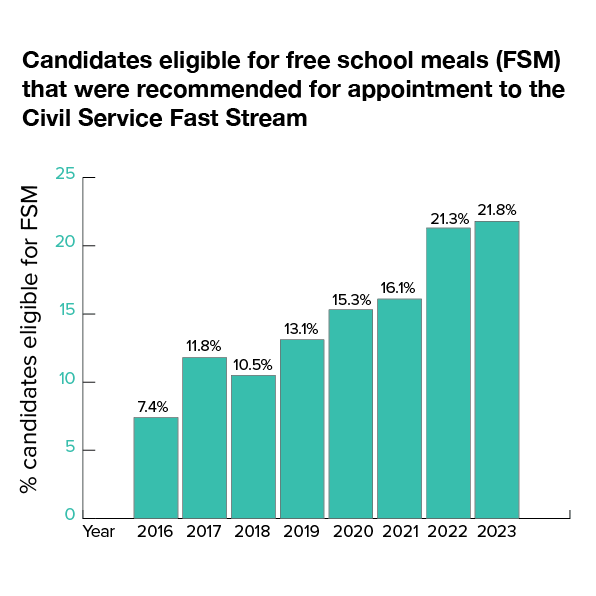Case Study:
The Civil Service Fast Stream
“We now have over 20% representation of people from lower socio-economic backgrounds, and this could not have been achieved without the expertise and advice from the Bridge Group.”
The Civil Service Fast Stream is an accelerated leadership development programme that provides talented graduates from a range of backgrounds with the experience, skills and knowledge needed to become leaders within the Civil Service.
In 2016, when the report Socio-Economic Diversity in the Fast Stream was published, 4.2% of Civil Service Fast Stream recruits were from a lower socio-economic background (based on parental occupation) – a lower percentage compared with the student population at Oxbridge.
Seven years later, Phil Wilson, Head of Training, Assessment and Curriculum at the Civil Service Fast Stream reports that the scheme now has “over 20% of people recruited from lower socio-economic backgrounds, which is characteristic of the university population at large.” (This includes a slight re-definition of how parental occupation is measured).
Phil reports that although the Cabinet Office had started measuring socio-economic background back in 2010, it was the independent report by the Bridge Group that provided the catalyst for change: “The outcomes of the work have been very successful in terms of improving the representation of people from lower socio-economic backgrounds in the Fast Stream. Every year there has been an improvement, up to and including 2023.”
The Bridge Group research explored the barriers relating to application and appointment among those from lower socio-economic backgrounds – and made a series of practical recommendations. Phil says: “One of the most useful aspects of the work was the granular analysis of the data, and the insights this afforded. It was so helpful to understand exactly what was going on at every stage of the application process.
“Another essential element was the set of practical recommendations, which proved to be very influential within the Cabinet Office. The Bridge Group’s credibility alongside a clearly written report with specific recommendations meant we got full endorsement from our senior sponsor and could implement all the recommendations.
“To get that seal of approval was very powerful indeed and laid the foundations for real change to be made.”
Phil reflects on colleagues’ responses when the report was published: “There were no hesitations from senior civil servants or the team which had worked directly on the project. All other parties, including recruitment, were equally positive. Everyone wanted to make a difference.”
Phil also considers which of the specific reforms have made the most difference: “Changes to the recruitment stage and rethinking cognitive testing has proven to be very effective. So has the mechanism of leveraging internships to deliver permanent recruitment, which has been used to identify individuals by their socio-economic background and then to support them to achieve permanent roles. The mechanisms adopted have been very different ways of doing things, and they have been completely fair and evidence-based.”
The work undertaken in 2016 was all about looking at the barriers to admission, but the Bridge Group has subsequently been commissioned to research the experiences of those on the Fast Stream scheme itself: their progression, inclusion and the culture. Phil is excited to be starting this project and working once again with the Bridge Group with its “insightful and measured” approach. Phil explains: “We are looking forward to finding out what has been happening to those that were selected for their roles, particularly how internships have led on to permanent graduate programme roles. We want to see how the recruits have progressed and whether they are prospering.
“It is great to be re-engaging with the Bridge Group – and exciting to see what we can learn from this new research and what successes we can achieve together.”
March 2024

